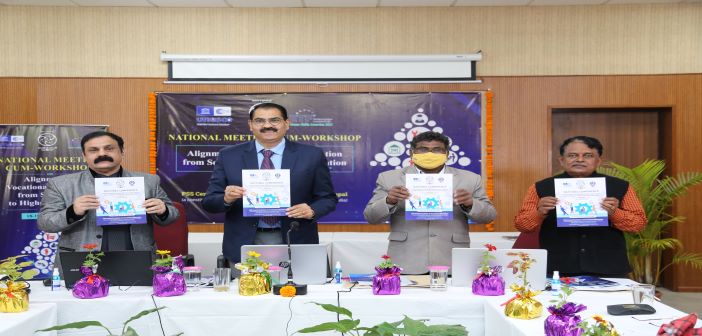The reluctance of the students to join vocational courses in schools is also due to the lack of a career pathway for moving to higher education (vertical mobility), besides the social stigma attached to it. To address this issue, the PSS Central Institute of Vocational Education (PSSCIVE), Bhopal conducted a two-days Online National Meeting-cum-Workshop on Alignment of Vocational Education from Secondary to Higher Education on 18 and 19 January 2022.
The meeting was inaugurated by Dr. Nirmaljeet Singh Kalsi, Chairman, National Council of Vocational Education and Training (NCVET), Ministry of Skill Development and Entrepreneurship (MSDE), Government of India. He spoke about leveraging ICT and developing linkages between various institutions, including Industrial Training Institutes, Polytechnics, Pradhan Mantri Kaushal Vikas Yojna Kendras, etc. through Hub and Spoke Model for imparting Vocational Education and Training (VET) and making provisions for educational mobility of students between schools, higher education institutions, and universities. Throwing light on the need for digitization in VET, the Joint Director of PSSCIVE, Prof. Rajesh P. Khambayat highlighted the role that the Institute is playing in promoting vocational education in schools.
The need for creating an enabling environment and mechanism to encourage students to take up vocational education was highlighted by Shri Santosh Kumar Yadav, Additional Secretary, Ministry of Education, Government of India. Dr. Sridhar Srivastava, Director, National Council of Educational Research and Training (NCERT) stated the need for bringing vocational education to the forefront in the educational system so that all the students are benefited from skill acquisition through VET.
The Vice-Chancellor of Shri Vishwakarma Skill University, Haryana Prof. Raj Nehru gave a brief about the B.Voc. degree courses being run by the University and the strategies for providing flexibility in terms of multi-entry and multi-exit provisions for students. Dr. Vinita Aggarwal, Executive Member, NCVET highlighted the need for introducing the credit-based framework for building pathways in vocational education. Dr. Vinay Swarup Mehrotra, Professor, PSSCIVE outlined the challenges and issues in vertical mobility of vocational students, including lack of standardisation and synergy in curriculum between school and higher education, absence of credit-based system in schools, and the need for introducing a semester system to provide the necessary flexibility in course offering and choice of subjects.
 Prof. Sitanshu S. Jena, Dean, School of Vocational Studies, Ambedkar University focussed on the importance of National Occupation Standards in bringing about quality in VET and the need for a multi-disciplinary approach to curricular changes.
Prof. Sitanshu S. Jena, Dean, School of Vocational Studies, Ambedkar University focussed on the importance of National Occupation Standards in bringing about quality in VET and the need for a multi-disciplinary approach to curricular changes.
Prof. Santosh Panda, Director, STRIDE, IGNOU spoke on providing alternative pathways for horizontal and vertical mobility of the vocational students through Open and Distance Learning (ODL). Prof. N.V. Verghese, Vice-Chancellor of the National Institute of Planning and Administration (NIEPA) highlighted the credit transfer framework under the National Skills Qualifications Framework. Shri S.K. Prasad, Director, Vocational Education, National Institute of Open Schooling (NIOS) informed about the role of NIOS in promoting horizontal mobility of vocational students. Dr. Leena Chandran Wadia, Senior Fellow, Observer Research Foundation, Mumbai stated that the National Education Policy (NEP) 2020 mandates that by 2025, at least 50 percent of learners should have exposure to vocational education through the school and higher education system, for which a clear action plan with targets and timelines has to be developed.
The focus should be on providing seamless horizontal and vertical mobility to the vocational students. Dr. Pushpendra Walia, Principal, BBK DAV College for Women, Amritsar pointed out that even today academic degrees are still considered more prestigious, therefore, developing a flexible system of vocational education is needed for providing skills attuned to the world of work. Shri Saurabh Johri, Planning Specialist and Consultant, Asian Development Bank suggested that a subject approach should be taken to facilitate vertical mobility of the graduates and vocational students should develop skills for multi-tasking.
Presentations were made by Dr. Mohammad Hussain, Director, Rajasthan Skill University, Prof. Jyoti Rana, Dean, Vishwakarma Skill University, Shri Siddharth Chaturvedi, Executive Vice President, Rabindranath Tagore University, Bhopal, and Dr. R. Bhavani Rao, Amrita Amrita Vishwa Vidyapeetham. also gave their views.
In the concluding session, Prof. V.S. Mehrotra presented the recommendations on aligning vocational education from school to higher education. The recommendations included creating an ecosystem for skilling, upskilling, and reskilling, promoting lifelong learning, closer collaboration, and coordination amongst stakeholders, skill mapping based on local opportunities for identification of vocational courses, the introduction of the credit-based system, development of bridge courses, better planning, and monitoring of vocational education, evidence-based research, strengthening of career guidance and counselling system at the institutional level.
The national meeting-cum-workshop was coordinated by Dr. P.Veeraiah, PSSCIVE, Bhopal.














our society racheri janta vikas gramudhyog samiti regd vill sireshgarh/dosarka po dhin distt ambala haryana some virous programme is launched by society skill development ,rural development,handloom,handicrafts ,fashion desaning ,beuticin,wollen shawal,computer ,tailoring cutting,embroidery etc i would request to you please our society our society 20/08/1990 to till date experince this programme can be handel i shall be thankful to you